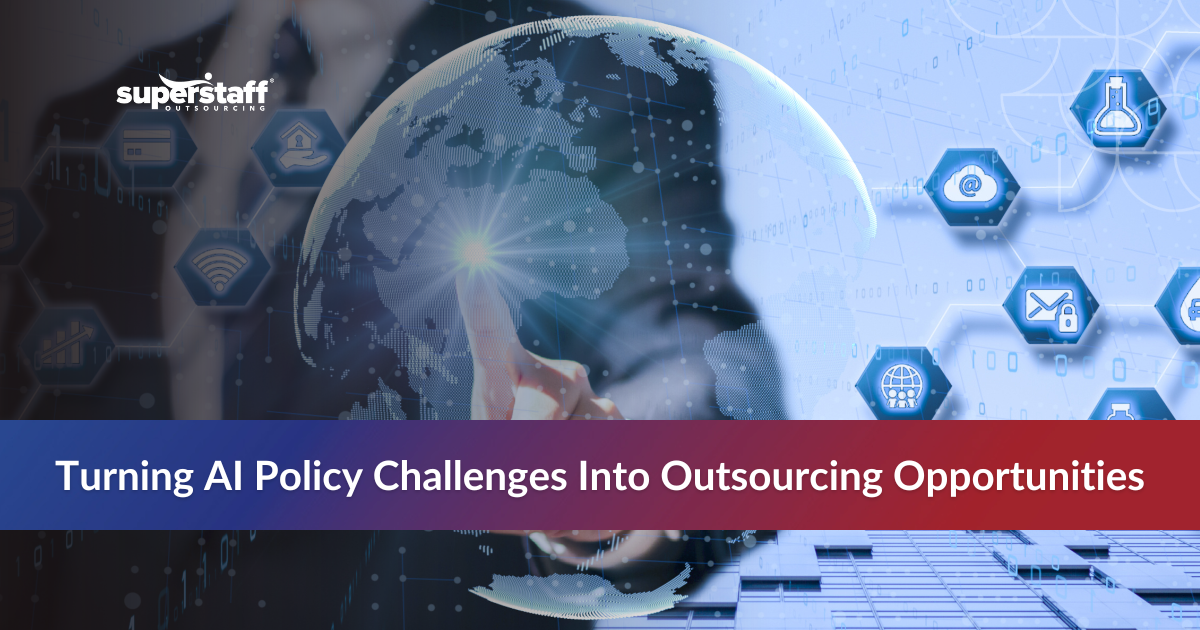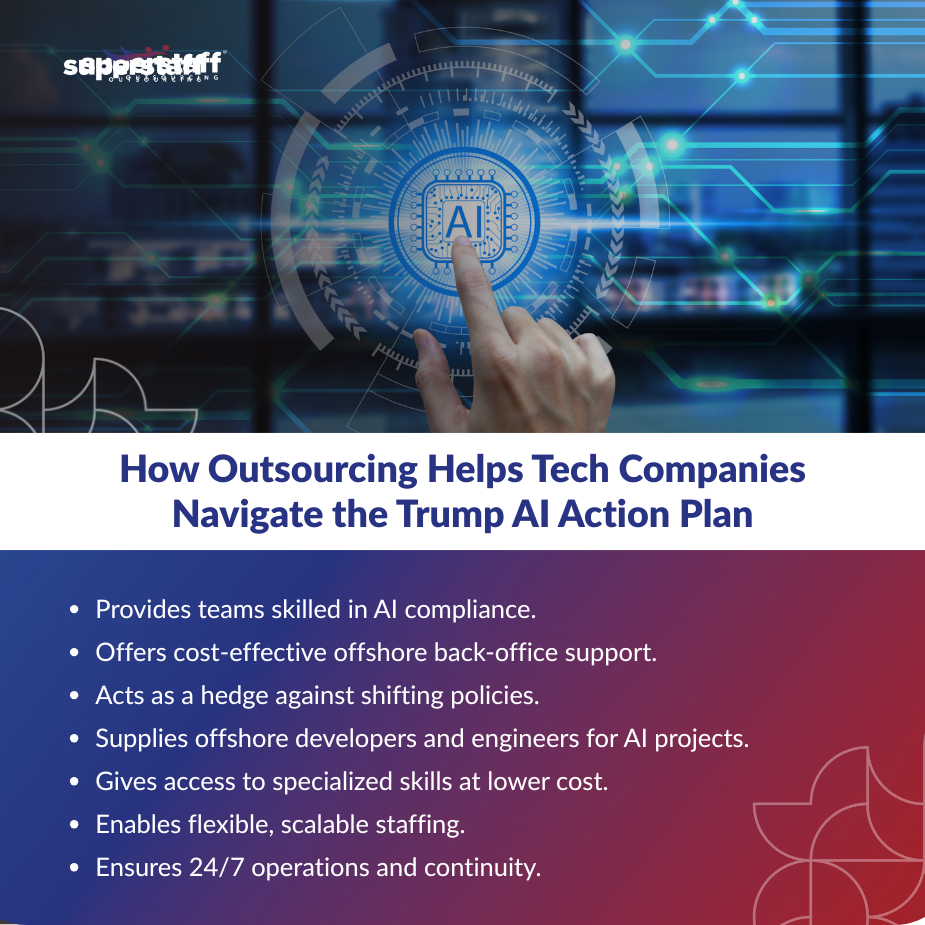
The recently unveiled Trump AI action plan has emerged as one of the most consequential policy shifts for the U.S. tech sector in recent years. Marketed as a way to ensure America leads the global race in artificial intelligence, the plan outlines aggressive goals for innovation while layering on new regulatory requirements. For midmarket and SME tech businesses—the backbone of innovation but often the most resource-constrained—the plan presents a dual reality. On one hand, it promises fresh opportunities for AI-driven growth. On the other, it imposes steep compliance burdens, workforce disruptions, and ongoing uncertainty around how Trump technology policy will evolve in practice.
Against this backdrop, outsourcing is no longer just a tactical option. It is becoming a strategic lifeline. By partnering with global outsourcing providers, especially when they outsource to the Philippines, U.S. businesses can maintain compliance, scale talent, and reduce costs while continuing to innovate. In fact, AI outsourcing strategies for US companies are proving to be the most pragmatic path to stability and growth in a volatile policy environment.
This blog explores how Trump’s AI action plan reshapes the regulatory and competitive landscape, the challenges it creates for tech businesses, and how outsourcing—done strategically—offers the agility and resilience companies need to thrive.
The Trump AI Action Plan Reshapes the Regulatory and Competitive Landscape
The Trump AI action plan introduces sweeping changes aimed at positioning the United States as both a leader in AI innovation and a guardian of ethical standards. But with ambitious targets come equally significant challenges, particularly for midmarket firms.
Impact on Data Governance and Compliance
One of the central pillars of the plan is a tightened focus on data governance. Companies must now implement more rigorous protocols around data collection, storage, and usage. While this bolsters consumer trust and strengthens America’s AI leadership narrative, it also creates complex compliance obligations. Large corporations may absorb these requirements with dedicated legal and compliance teams, but SMEs face disproportionate costs in building similar capabilities.
Implications for Workforce Roles and Reskilling
The policy also emphasizes reskilling and reconfiguring the workforce. AI integration means certain job roles will be automated, while others—particularly those involving oversight, training, and AI maintenance—will expand. For SMEs, this necessitates investing in reskilling programs at a time when resources are already stretched thin. Without support, many risk falling behind.
Potential Cost Burdens on SMEs vs. Large Corporations
Perhaps the most glaring inequality lies in how compliance costs are distributed. Large enterprises can spread compliance expenses across vast operations, whereas SMEs must absorb the costs directly. This imbalance threatens to stifle innovation in smaller companies, even as they remain vital players in the competitive U.S. tech ecosystem.
With disruption comes the need for agile strategies to sustain growth—and outsourcing is emerging as one of the most effective tools.
Tech Businesses Face New Operational Challenges Under Evolving AI Regulations
The complexity of the Trump technology policy means midmarket and smaller firms are navigating a maze of new operational challenges.
Compliance Costs for Smaller Tech Firms
Building AI-compliant systems isn’t cheap. It involves everything from cybersecurity enhancements to legal reviews and regular audits. For smaller tech businesses, these costs divert funds away from innovation, potentially hindering their ability to compete with larger rivals.
Uncertainty in Talent Needs and AI Deployment
AI’s rapid evolution creates uncertainty in staffing. Companies must balance hiring AI specialists with retraining existing employees. Yet many SMEs struggle to attract the highly specialized talent required to meet both technical and compliance demands.
Increased Demand for Risk Mitigation Strategies
Beyond staffing, companies face heightened risks—legal, operational, and reputational. A compliance misstep under stricter AI regulations could lead to penalties, loss of consumer trust, or even forced halts in product rollouts. As a result, risk mitigation has shifted from being a nice-to-have to a business necessity.
Strategic outsourcing provides a pathway to balance compliance and innovation while keeping costs under control.

Strategic Outsourcing Ensures Compliance and Risk Management Under New AI Policies
As the Trump AI action plan reshapes business priorities, outsourcing emerges as an essential strategy for tech companies navigating compliance and risk.
Access to Teams Experienced in AI Compliance
Outsourcing firms, particularly those specializing in regulated industries, bring deep expertise in managing compliance frameworks. U.S. companies can leverage this knowledge without having to build expensive internal teams, ensuring they meet the new requirements under Trump’s AI policy.
Offshore Back-Office Support for Documentation and Reporting
AI compliance requires meticulous documentation and continuous reporting. These repetitive yet critical tasks can be efficiently handled by offshore teams. By choosing to outsource to the Philippines, businesses tap into a skilled workforce that combines cost-efficiency with high levels of English proficiency, ensuring accurate and timely reporting.
Outsourcing as a Hedge Against Policy Volatility
Perhaps most importantly, outsourcing acts as a hedge against volatility. If U.S. regulations shift again—as they often do—outsourcing provides the agility to scale compliance efforts up or down without overhauling internal structures.
But outsourcing isn’t just about compliance—it’s also a catalyst for innovation.
Outsourcing Empowers Tech Businesses to Sustain Innovation While Managing Costs
While compliance is critical, innovation remains the lifeblood of tech businesses. The Trump technology policy risks bogging companies down in regulatory requirements at the expense of creative progress. Outsourcing provides a way to keep innovation alive.
Offshore Developers and Engineers Supporting AI Integration
By leveraging offshore developers—especially in the Philippines, a hub for tech-enabled outsourcing—U.S. firms can accelerate AI integration without overstretching their internal teams. These professionals bring specialized skills that complement domestic teams, driving projects forward faster.
Cost-Effective Access to Specialized Skills
Hiring AI experts in the U.S. is notoriously expensive. Outsourcing allows companies to access highly skilled professionals at a fraction of the cost, freeing up budgets for R&D and product development.
Flexibility to Scale Teams Without Long-Term Overhead
Outsourcing also provides scalability. Companies can expand or contract teams based on project needs, avoiding the overhead of permanent hires. This flexibility is especially valuable in times of regulatory uncertainty when long-term commitments may feel risky.
These benefits become even more critical in an uncertain economic environment, making outsourcing a cornerstone of future-ready strategies.
Global Outsourcing Partnerships Strengthen Resilience Amid Policy-Driven Disruptions
In today’s interconnected economy, resilience requires global partnerships. The Trump AI action plan is just one reminder that U.S. policy can shift suddenly, impacting business operations overnight.
Nearshore and Offshore Locations as Stable Anchors
By diversifying through nearshore and offshore outsourcing, companies spread operational risks. The Philippines, Colombia, and other strategic locations serve as stable anchors that ensure continuity even when U.S. regulations disrupt operations at home.
24/7 Operations That Ensure Continuity
Outsourcing also enables round-the-clock operations. With offshore teams in different time zones, companies can maintain productivity while simultaneously responding to compliance or regulatory needs in real time.
Diversification of Operations to Reduce Dependence on U.S. Policy Shifts
Perhaps the greatest advantage lies in diversification. By building global partnerships, tech firms reduce their exposure to U.S.-centric policy risks, ensuring they can continue to operate, innovate, and grow regardless of domestic political changes.
As tech leaders look ahead, outsourcing proves itself to be more than a cost-saving tool—it is a strategic enabler of resilience and growth.
Understand the Trump AI Action Plan and How It Affects Your Business
The Trump AI action plan represents both risk and opportunity for U.S. tech businesses. On one hand, it raises the bar for compliance, reskilling, and operational costs—particularly for SMEs and midmarket firms. On the other, it provides the impetus for companies to embrace new strategies that balance regulation with innovation.
Outsourcing has emerged as the clear path forward. By leveraging AI outsourcing strategies for US companies, businesses can ensure compliance, access specialized skills, scale cost-effectively, and build resilience against future disruptions. And by choosing to outsource to the Philippines, U.S. firms gain a trusted partner in navigating these challenges while unlocking opportunities for innovation and growth.
For tech leaders facing the complexities of Trump technology policy, the message is clear: outsourcing isn’t just an operational decision—it’s a strategic imperative.
Ready to safeguard compliance, reduce risks, and accelerate innovation in the age of AI? SuperStaff is here to help. Let’s build the outsourcing strategies that will carry your business forward in this new era of technology policy.






